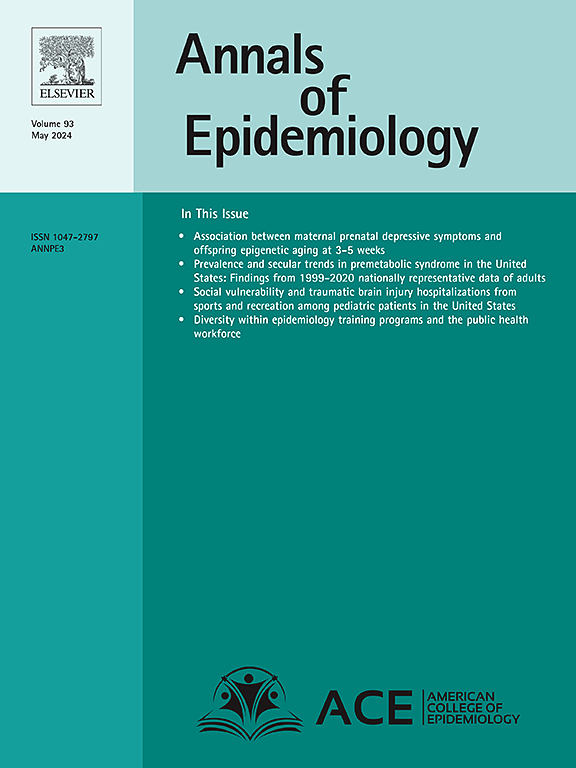Unraveling shared and unique genetic causal relationship between gut microbiota and four types of uterine-related diseases: Bidirectional Mendelian inheritance approaches to dissect the "Gut-Uterus Axis"
IF 3.3
3区 医学
Q1 PUBLIC, ENVIRONMENTAL & OCCUPATIONAL HEALTH
引用次数: 0
Abstract
Background
The gut microbiota has emerged as a pivotal factor in the etiology of uterine-related diseases. This study aims to elucidate the genetic causal link between gut microbiota composition and these conditions, focusing on the systemic impact and uterine pathology to better understand the "Gut-Uterus Axis."
Methods
We utilized pooled data from two different GWAS databases, including data from 209 gut microbiota traits and data from four uterus-related diseases. Bidirectional Mendelian Randomization (MR) approaches, incorporating Bayesian weighting and traditional inverse variance weighting (IVW) methods, were employed to explore causal relationships. The robustness of findings was ensured through sensitivity analyses, outlier testing, and MR-PRESSO analysis.
Results
Seventeen significant associations were identified between gut microbiota traits and uterine-related diseases, suggesting potential causal links. These associations were consistent across sensitivity analyses, affirming the reliability of our results. Conversely, reverse MR analyses did not reveal statistically significant associations between uterine diseases and bacterial traits, indicating a unidirectional influence of gut microbiota on uterine health. These findings highlight the complex interplay within the "Gut-Uterus Axis."
Conclusion
This research establishes a causal relationship between gut microbiota and uterine diseases, advocating for targeted interventions to mitigate associated risks. It underscores the interconnectedness of gut and reproductive health, promoting a holistic approach to management and treatment within the "Gut-Uterus Axis".
揭示肠道微生物群与四种子宫相关疾病之间共同和独特的遗传因果关系:剖析 "肠道-子宫轴 "的双向孟德尔遗传方法。
背景:肠道微生物群已成为子宫相关疾病病因学中的关键因素。本研究旨在阐明肠道微生物群组成与这些疾病之间的遗传因果关系,重点关注系统性影响和子宫病理学,以更好地理解 "肠道-子宫轴":我们利用了来自两个不同GWAS数据库的集合数据,包括209个肠道微生物群性状的数据和4种子宫相关疾病的数据。我们采用了双向孟德尔随机化(MR)方法,结合贝叶斯加权法和传统的逆方差加权法(IVW)来探讨因果关系。通过敏感性分析、离群值测试和 MR-PRESSO 分析,确保了研究结果的稳健性:结果:在肠道微生物群特征与子宫相关疾病之间发现了 17 种明显的关联,表明两者之间存在潜在的因果关系。这些关联在各种敏感性分析中都是一致的,这证实了我们结果的可靠性。相反,反向 MR 分析并未发现子宫疾病与细菌性状之间存在统计学意义上的显著关联,这表明肠道微生物群对子宫健康的影响是单向的。这些发现凸显了 "肠道-子宫轴 "之间复杂的相互作用:这项研究确定了肠道微生物群与子宫疾病之间的因果关系,主张采取有针对性的干预措施来降低相关风险。它强调了肠道与生殖健康之间的相互联系,提倡在 "肠道-子宫轴 "内采取整体管理和治疗方法。
本文章由计算机程序翻译,如有差异,请以英文原文为准。
求助全文
约1分钟内获得全文
求助全文
来源期刊

Annals of Epidemiology
医学-公共卫生、环境卫生与职业卫生
CiteScore
7.40
自引率
1.80%
发文量
207
审稿时长
59 days
期刊介绍:
The journal emphasizes the application of epidemiologic methods to issues that affect the distribution and determinants of human illness in diverse contexts. Its primary focus is on chronic and acute conditions of diverse etiologies and of major importance to clinical medicine, public health, and health care delivery.
 求助内容:
求助内容: 应助结果提醒方式:
应助结果提醒方式:


